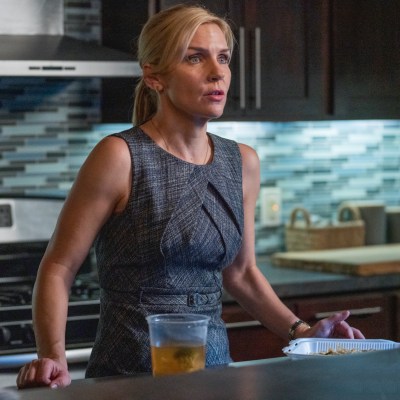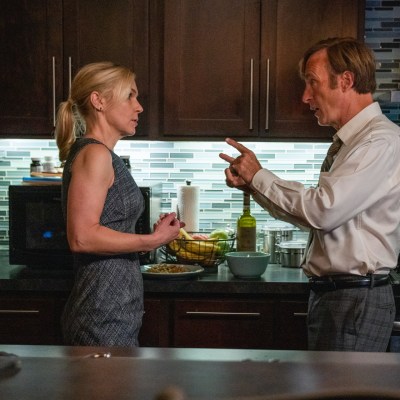Better Call Saul Confronts Its Legacy in Season 6
As Better Call Saul heads into its sixth and final season, the AMC hit has found a way to carve out its own path beyond the enormous shadow of its big brother, Breaking Bad. The series combines incredible cinematography, outstanding acting, and intelligent storytelling in a peerless fashion.
As we continue to anticipate the show’s final episodes, we were lucky enough to get the chance to talk with executive producer Thomas Schnauz about how much the drama has already accomplished, how instrumental actors like Rhea Seehorn and Tony Dalton have been to the program’s success, and what the show’s lasting legacy will hopefully be.
Den of Geek: Do you have any inklings of information on whether AMC is going to split the sixth season into two parts? This has been a rumor for quite some time and I know Peter Gould said he had hoped it would be aired as a single entity.
Thomas Schnauz: I don’t know. Because of the COVID delays, and then Bob’s heart attack and recovery, I have zero idea when or how the episodes will be aired. Everything with production is moving forward, steady but slow. We’re filming scenes that don’t involve Bob right now. I just finished editing my director’s cut of episode 607, and I addressed some notes on my script for 611. I’m still waiting to hear the dates of when I’ll prep and direct 611.
Heading into the final season, Better Call Saul is different from a lot of other shows in that we already know what Jimmy McGill’s fate is going to be. What we don’t know is what Gene Takovic’s closure represents. How much more prevalent will those scenes be in the sixth season?
We will of course address Gene’s future, but I’m not at liberty to say how much or how little will be in the show. We talked about it a ton when we were breaking the episodes, and all we writers can do is go with our gut about how much Gene we see. Everyone chimed in with thoughts, and Peter Gould had the ultimate choice, and I think he picked an amount that we’re all happy with.
The fifth season of the show got a lot more action-oriented than past installments as Jimmy and Kim themselves go a little too close to the cartel. Can we expect the violence to be ramped up even more in the final season? How do you balance keeping the same tone the show has always had while realizing that things change as you get close to the finish line?
We don’t really pay attention to matching the tone or the amount of violence that came before in previous seasons. We just do what’s right for the current story. The show has always been violent in my eyes, since season 1, with Tuco and the skate twins, Nacho’s threats to Jimmy, Mike in Philly… and also emotionally violent, with Chuck betraying his brother. So there will be more physical and emotional violence in season 6, but I can’t swear that it’s any more than we had before. We’re coming to the end, so whatever happens will probably hit harder.
Many people have come to view Lalo Salamanca (Tony Dalton) as the best antagonist in the entire Breaking Bad/Better Call Saul universe. Will his role be even larger in the final season than before and do you and the other writers regret not bringing the character into the fold earlier in the series?
Season 5 felt really special to me. I just felt like we were clicking on all cylinders, and Tony Dalton was a big part of that. We certainly talked about bringing in the character Lalo as far back as season 1, but now with 20/20 hindsight it feels he came in at the perfect time. I can’t say if Lalo’s role will be bigger or smaller in season 6, but he was certainly pissed off and a man on a mission in the season 5 finale.
Last season you wrote one of the most acclaimed episodes in the series, “Bad Choice Road”. How much of the iconic scene with Lalo interrogating Jimmy and Kim at home came from your own imagination and how much of it was a group effort from the whole team?
We writers all work together on all of the episodes, and it’s just too hard to remember who came up with what beat/line/idea. On my Twitter page (@tomschnauz) I post the boards that we work on (index cards with all the story beats), which is a good indication of what we came up with in the room. I want to say that I did pitch the Lalo interrogation technique of having your prisoner repeat the same story over and over until there’s a discrepancy, but I can’t swear to it. When it comes time to write, we use the cards to help guide us, so the “writer” of the episode puts his/her spin onto it, but even after that, a writer will sit with Peter and often another writer to either streamline or, sometimes, bulk up a scene if it’s feeling thin.
Did anybody realize what an asset Kim Wexler was going to be to Better Call Saul when the show first started? Was it always the intent to make her a de-facto lead, or did Rhea Seehorn impress so much that it just came about naturally as the plot and the themes kept progressing and calling for exploration of her character?
We had zero idea what Kim’s role would be in the series. In fact, I think the writers were still debating into season 2 if Kim and Jimmy had an intimate relationship prior to us meeting her in season 1, or were they just friends? I wrote the line about the “sex robot voice” in episode 3, so I was in the camp of: “they started something but career took over and it didn’t quite go anywhere.” We knew Rhea was good when we saw her audition tape, but then seeing her in the role as we were filming season 1 — all the nuance, the humor, the gleam in her eyes — we knew we had a special combination with her and Bob.
These actors share that indescribable thing when you watch them — when the characters struggle against a system stacked against them, you root for them, but then… when they start “breaking bad” and doing things they shouldn’t, you still root for them! Maybe you’re not rooting for them to succeed in the horrible thing they’re doing, but you’re still with them and shouting, “No, turn back! Don’t get caught!” So, to answer the question, the series is what it is and Kim is who she is because Rhea worked so hard and brought so much to the character. It definitely helped the writers make choices about where the plot should go.
What do you want Better Call Saul to be remembered for What element should be considered its lasting legacy? Do you think this has been a show that has the ability for people to continue to discover for many years to come?
When we started this show, I thought we’d have very limited viewership — a small percentage of the people who watched Breaking Bad. I would have been thrilled with 50% of that audience. But I’ve been delighted to meet and hear from fans who have never seen the original show. I’m hoping people will go back and rewatch both Breaking Bad and Better Call Saul because of the way we wrote them: we didn’t go in with an overall plan, and when we finished writing one episode, we weren’t exactly sure what was going to happen next.
So the writing was a struggle and we put ourselves into tight corners, and when searching for an answer for these problems we created, we were often surprised, and I hope that comes through in the viewing. The plot is not predictable, and the answers are hard to get to, so I hope both series stand up to repeated viewing.
Better Call Saul season 6 is expected to premiere in 2022. Check back with Den of Geek tomorrow for more BCS tidbits from Thomas Schnauz.
The post Better Call Saul Confronts Its Legacy in Season 6 appeared first on Den of Geek.
From https://www.denofgeek.com/tv/better-call-saul-season-6-update/



